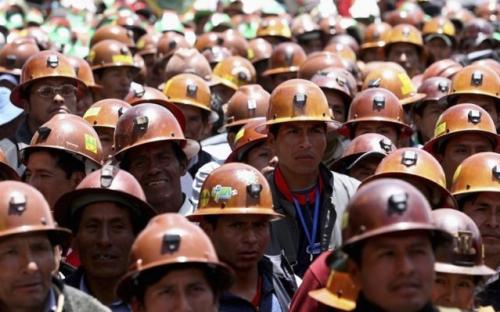Reaffirmation of the national popular and anti-imperialist process
The concentrations of February 21, some for and others against the candidacy of Evo Morales, revealed two opposing faces.
- Análisis

Massive and combative mobilizations and popular concentrations in the cities of Bolivia, on February 21, principally in the plazas San Francisco in La Paz, 14 de Septiembre in Cochabamba and Chiriguano in Santa Cruz, in defense and proclamation of the candidature of Evo Morales Ayma for the national elections of December 2019, have been a demonstration of the vitality of the patriotic national-popular and anti-imperialist movement of the Proceso de Cambio (Process of Change) that celebrated its twelfth anniversary on January 22, 2018.
Even though the political and civic opposition maintains its challenge to the legality of a second re-postulation of Morales Ayma, based on the new Political Constitution of the State that prohibits it, the Plurinational Constitutional Tribunal emitted a sentence of general validity that underlines the right of any citizen to elect and be elected without any restriction of a political character, which enables all the national, departmental, institutional and municipal authorities and representatives to present their candidatures, so that finally, it is the popular vote that will decide its preferences.
Added to this is the decision of the 17th Congress of the Central Obrera Boliviana (COB – Bolivian Workers’ Central Union) -- that gathers the unions and organizations of workers from the countryside and the cities and has a long history of struggle and engagement-- to support the Democratic and Cultural Revolution, and the Proceso de Cambio, as well as the presidential candidature of Evo Morales. The Congress, which took place in Santa Cruz from February 19 to 25, elected as its new Executive Secretary the miners’ leader Juan Carlos Huarachi, who indicated that the COB would propose that the candidate for Vice President to accompany Morales Ayma should be a worker and that they would aim for a strong parliamentary brigade of Bolivian workers.
The decision of the Congress of the COB also means the strengthening of the social and popular organizations grouped in the Pacto de Unidad (Pact of Unity) and the Coordinadora Nacional por el Cambio (CONALCAM – National Coordination for Change), that have become fundamental political pillars of the government of the Movimiento Al Socialismo (MAS- Movement Towards Socialism) for over a decade. CONALCAM includes organizations of peasants, peasant women, colonizers or ‘interculturals’, indigenous peoples of the highlands and lowlands, the neighborhood councils, cooperatives and workers of different sectors.
The concentrations of February 21, some for and others against the candidacy of Evo Morales, revealed two opposing faces. On one side, the social composition was mainly popular, with population from the rural and marginal zones, and worker and peasant speakers, while on the other the principal composition was from traditional middle-class and well-off sectors, where the speakers were civic, intellectual or religious figures. Also, the urban areas occupied were clearly defined: the former in popular districts and the latter in central zones. The polarization was also present in the campaigns on digital social networks, while the corporate media sustained a campaign to discredit the president and his government.
Finally, it is evident that the electoral campaigns for December 2019 have already begun and the candidates have launched their proposals. Evo Morales will continue the Process of Change and the eradication of extreme poverty, with the Patriotic Agenda 2025; Ruben Costas, governor of Santa Cruz, presents his proposal of Federalism for Bolivia; Samuel Doria Medina, of Unidad Nacional has liberal proposals. Meanwhile, other potential candidates have still not revealed their proposals. (Translated for ALAI by Jordan Bishop)
- Eduardo Paz Rada, Bolivian sociologist and teacher at UNSA. He contributes to publications in Bolivia and Latin America.
05/03/2018
Del mismo autor
- América Latina y la guerra en Ucrania 14/03/2022
- Industrialización y sustitución de importaciones 01/03/2022
- Bolivia: soberanía en la política internacional 03/01/2022
- A un año de la recuperación democrática en Bolivia 08/11/2021
- Rómulo Calvo: jefe de la oposición en Bolivia 27/10/2021
- El poderoso Brasil en una encrucijada histórica 12/10/2021
- Arce contra el intervencionismo de la OEA 30/09/2021
- Bolivia: la campaña del periódico Página Siete contra Evo y el proceso nacional-popular 01/09/2021
- Recuperar la estrategia geopolítica latinoamericana 13/08/2021
- La guerra mediática contra el gobierno boliviano 21/07/2021








